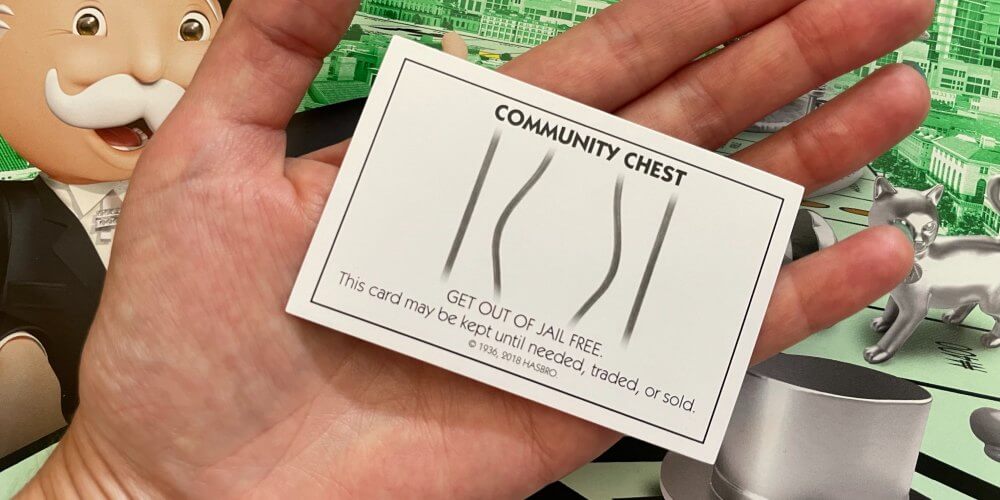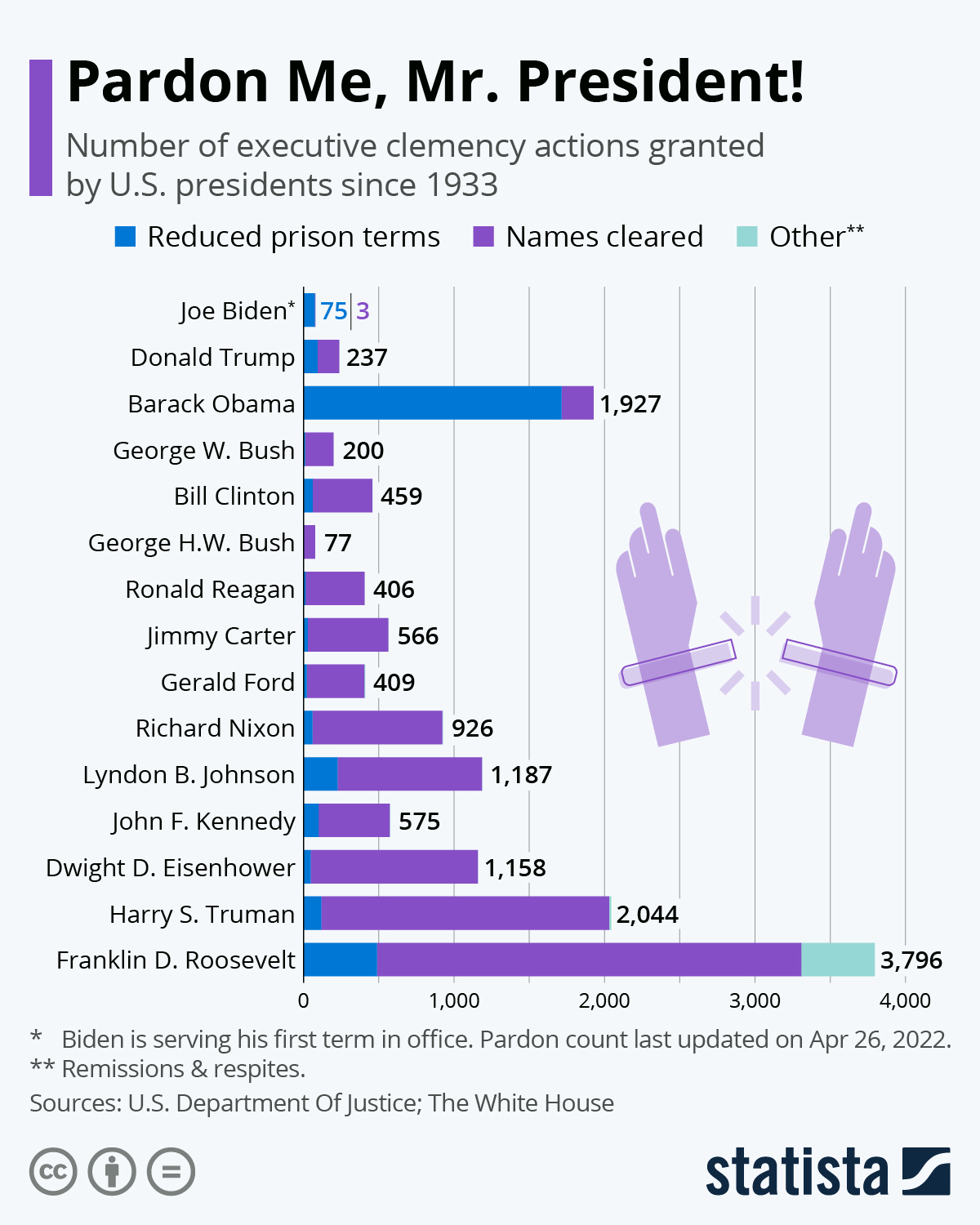Being in jail in Monopoly isn’t too much of an inconvenience. According to the Monopoly jail rules, you can still collect rent, buy properties in an auction, and add houses or hotels to sets that you own.
In Monopoly, a Get Out of Jail Free card is nice to have, but not really essential.
But do Get Out of Jail Free cards exist in real life, where they could be much more useful?

The answer is…kinda. There’s not an official card, but there are a few different options that people have used (or tried to use).
Let’s take a closer look at five examples of real-life Get Out of Jail Free Cards…
Is there a real Get Out of Jail Free card?
There is no official Get Out of Jail Free card in real life, although there are similar examples in the real world. The NYPD union gives out preferential treatment cards to officers, while the US President can pardon people who are jailed.
5 Real life Get out of Jail Free cards examples:
- NYPD Police Benevolent Association Cards
- Presidential pardons
- Tickets to a UK lottery held in 1567
- Monopoly Get Out of Jail Free cards (this won’t work!)
- ‘Real’ Get Out of Jail Free cards… offered on a fictional date
5 Real Life Get Out of Jail Free Card Examples:
1. NYPD Get Out of Jail Free Cards
The most common example of something close to a Get Out of Jail Free card in real life is Police Benevolent Association cards in New York, USA. These are handed out to officers to pass on to friends and family by an NYPD union.
It’s important to note that these are not actually cards that can get people out of punishment for a crime, but they are intended to let people show officers that they are a friend or family member of someone who works in law enforcement.
In reality, it has been demonstrated that owners of Police Benevolent Association (PBA) cards do get preferential treatment for minor misdemeanors, such as running a red light or other relatively small driving infractions.
Yet, that is only down to the decision on the officer’s part. The official line from the NYPD is that these cards should be ignored in decision-making.
PBA cards are not handed out as liberally as they once were, because they started to appear on eBay. Valid cards were selling for up to $200 and even expired cards were still being sold for smaller amounts.
You can even buy PBA Family Member ID card wallets on Amazon!

In reality, you can’t rely on PBA cards to save you from jail, as most officers will just ignore them and punish you anyway.
2. President Issued Get Out of Jail Free Cards
The US Constitution grants the power of pardon to the serving President. This allows the President of the United States to set aside any punishment for a federal crime.
It does not apply to state laws, and it can be refused. Because a pardon carries with it an imputation of guilt, accepting a pardon means accepting that you committed the crime.
Presidential pardons have been issued since George Washington, and while the President can pardon anyone at any time during their service, most presidents use their final months to issue the most pardons.
Donald Trump granted 116 pardons in the 2021 fiscal year in his last three and a half months in charge. This accounted for over 80% of his granted pardons.
Barack Obama granted 142 pardons in his equivalent period in 2017, around 67% of the pardons he granted in his two terms.
 Charted by Statista
Charted by StatistaNotable instances of pardons include when Gerald Ford pardoned former President Richard Nixon, the only President to have been pardoned, and the 140 pardons granted on Bill Clinton’s last day in office, which was widely criticized.
There were rumors that Donald Trump may pardon himself, with self-pardoning never really tested in courts, but these were unfounded.
Pardons have to be requested, and generally involve prominent people in the media or political worlds. It’s unlikely the average person will be granted a pardon unless they have a special reason.
3. The 1567 Lottery In Britain
We have to go back in time and across the pond for this next example.
In 1567, Queen Elizabeth I held the first-ever national lottery in England, with the plan to raise funds to build ships and develop ports so that the country could expand its exports.

Tickets to enter The Great Lottery cost ten shillings, which in today’s money would be around £120 or $166. The winner of the lottery would get £5,000, which in modern times was worth around £1.2 million or $1.6 million.
However, more interestingly was the fact that, in order to encourage ticket sales, anyone who bought a ticket was granted an exemption for arrest for all crimes, except for the most serious – murder, piracy, major felonies, or treason.
The lottery ticket, therefore, became one of the first-ever recorded Get Out of Jail Free cards.
4. A Monopoly Get Out of Jail Free card…
This one doesn’t quite count as an example, since it didn’t work. But, in 2017 a Minnesota Sheriff’s Deputy pulled over a car registered to a woman with an outstanding warrant. A man in the back seat was not wearing a seatbelt, and when the Deputy ran his details it was found that he too had an outstanding warrant.
On being asked to exit the vehicle, the suspect asked the officer to check his front pocket – where he found a Monopoly Get Out of Jail Free card.
The officer later admitted that he had been sorely tempted to let the suspect go, but instead he was taken into the precinct before being transferred to the location of the warrant.
The officer asked the man if he could take a photo of the Get Out of Jail Card and it ended up on the Dakota County Sheriff’s Office Facebook page.
So, the lesson here is not to try using Monopoly cards (or indeed, any Monopoly accessories) in real life.
5. A ‘Real’ Offer from the Police
One last example from recent times wasn’t quite what it seemed, and showed the police do have a sense of humor.
In February 2020, the Bath Township Police Department in Michigan posted an offer on Facebook. They said that anyone could stop by the police department to pick up their free Get Out Of Jail card. The card could be used by anyone to get out of any arrest situation “no questions asked”.
The catch? The cards were only available to pick up on February 30th – a day that does not exist.
The post even included a friendly dig at a rival police department, saying that the cards will not work for the East Lansing Police Department “because they are mad that we have a Monopoly on the good Facebook posts”.
I love this fun example of a police department using social media to engage local residents.
To conclude
A Get Out Of Jail Free card that’s available to the average Joe doesn’t really exist. But there are times when people have used the equivalent of a Get Out of Jail Free card to avoid punishment for crimes.
The key word to think about here is “free” – it’s a lot easier to avoid jail if you can hire a good lawyer, or you’ve got some power as a result of being from a wealthy background.
Of course, the best thing to do is to try to avoid committing a crime in the first place! There’s no need for a Get Out of Jail Free card if you’re following the law.
However, when it’s a minor infraction that was accidental, such as a mistake while driving, it’s a nice thought to be able to present a card to get you out of trouble.
You could always try writing to the President and asking for a pardon, but if it’s for something minor like running a red light, they’ve probably got more important matters to deal with.

